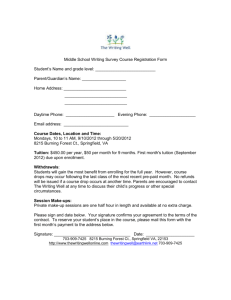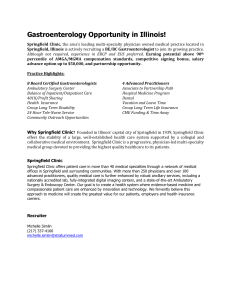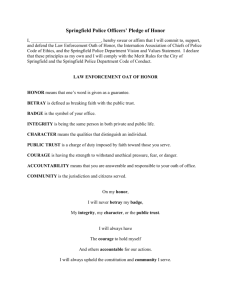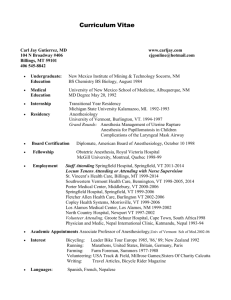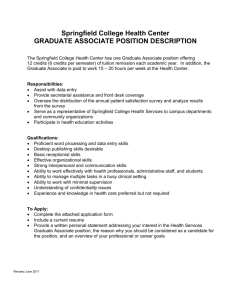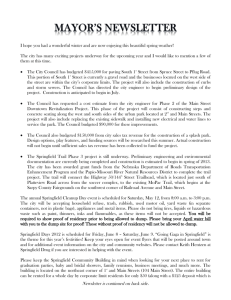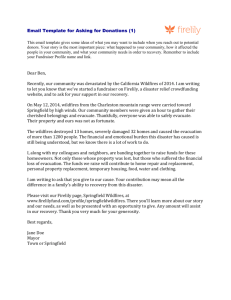alcohol and the body - Springfield College
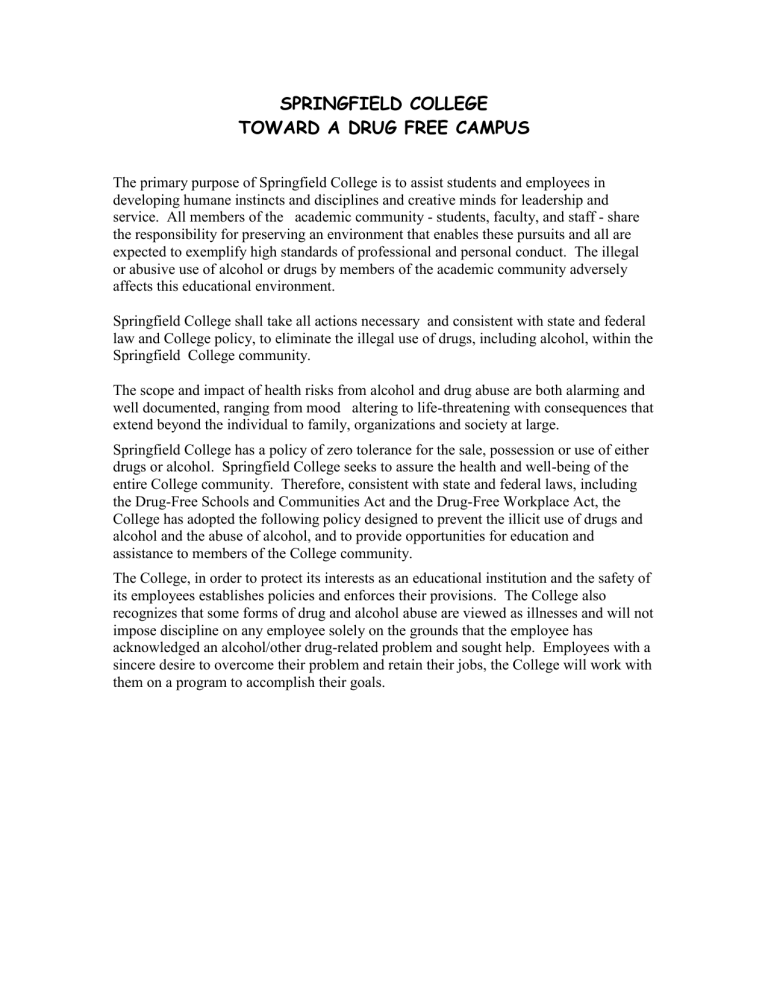
SPRINGFIELD COLLEGE
TOWARD A DRUG FREE CAMPUS
The primary purpose of Springfield College is to assist students and employees in developing humane instincts and disciplines and creative minds for leadership and service. All members of the academic community - students, faculty, and staff - share the responsibility for preserving an environment that enables these pursuits and all are expected to exemplify high standards of professional and personal conduct. The illegal or abusive use of alcohol or drugs by members of the academic community adversely affects this educational environment.
Springfield College shall take all actions necessary and consistent with state and federal law and College policy, to eliminate the illegal use of drugs, including alcohol, within the
Springfield College community.
The scope and impact of health risks from alcohol and drug abuse are both alarming and well documented, ranging from mood altering to life-threatening with consequences that extend beyond the individual to family, organizations and society at large.
Springfield College has a policy of zero tolerance for the sale, possession or use of either drugs or alcohol. Springfield College seeks to assure the health and well-being of the entire College community. Therefore, consistent with state and federal laws, including the Drug-Free Schools and Communities Act and the Drug-Free Workplace Act, the
College has adopted the following policy designed to prevent the illicit use of drugs and alcohol and the abuse of alcohol, and to provide opportunities for education and assistance to members of the College community.
The College, in order to protect its interests as an educational institution and the safety of its employees establishes policies and enforces their provisions. The College also recognizes that some forms of drug and alcohol abuse are viewed as illnesses and will not impose discipline on any employee solely on the grounds that the employee has acknowledged an alcohol/other drug-related problem and sought help. Employees with a sincere desire to overcome their problem and retain their jobs, the College will work with them on a program to accomplish their goals.
WHAT IS COLLEGE POLICY?
Springfield College seeks to provide every employee with an environment that is free from illicit drugs and/or alcohol. Accordingly, the unlawful use, possession, purchase, sale, distribution and/or manufacture of illegal drugs, controlled substances, and alcoholic beverages, and the improper use of prescription medicines on property owned, rented, leased, or controlled by Springfield College or at any Springfield College sponsored event is prohibited. Persons engaged in the aforementioned activities or under the influence of alcohol or controlled substances will be subject to dismissal and arrest.
Springfield College abides by Massachusetts State Law concerning the sale, possession and use of alcohol. Persons under the age of 21 who purchase or knowingly possess an alcoholic beverage violate State law and College policy. Any person who furnishes an alcoholic beverage to a person under 21 years old is in violation of state law. Any employee who violates this policy may be subject to prosecution, disciplinary actions and/or required to satisfactorily complete an approved drug/alcohol abuse rehabilitation program. All employees are expected to inform themselves and comply with the
College’s drug and alcohol abuse policies.
DESCRIPTION OF HEALTH RISKS
Serious health and personal risks are associated with the use of illegal drugs and abuse of alcohol. They may include temporary or permanent physical or mental impairment, and injury or death. Use and abuse of such substances may give rise to conduct which causes injury, death or damage to the user/abuser or to the person or property of others, resulting in criminal or civil prosecution and liability.
DRUGS AND THE BODY
NARCOTICS (Heroin)
Initial euphoria followed by drowsiness and nausea
Constricted pupils, watery eyes, dazed look
Overdose may produce slow, shallow breathing, clammy skin, loss of appetite and weight, and possible death
DEPRESSANTS (Barbiturates, tranquilizers)
Relaxed muscles, calmness, drowsiness
Confusion, disorientation, slurred speech
Overdose may produce shallow breathing, clammy skin, weak and rapid pulse, coma, and possible death
STIMULANTS (Cocaine, Methamphetamine)
Increased heart and respiratory rate, elevated blood pressure, decreased appetite
Blurred vision, dizziness, insomnia, anxiety
High doses can cause physical collapse, irregular heartbeat, stroke, and possible death
HALLUCINOGENS (LSD, PCP, Mushrooms)
Illusions and hallucinations
Confusion, panic, anxiety, depression, and poor perception of time and distance
Respiratory failure, death due to careless behavior
CANNABIS (Marijuana, Hashish)
Increased heart rate, bloodshot eyes, dry mouth and throat, and increased appetite
Interferes with memory, speech, coordination, and perception of time
Increased risk of lung cancer, weakened immune system, and affects reproductive system
ALCOHOL AND THE BODY
Impairment of brain function, judgment, alertness, coordination, and reflexes
Attitude and/or behavioral changes, such as uncharacteristic hostility, or increased risk taking, such as driving recklessly
Alcohol taken with other drugs can intensify the effects of the drug. Alter the
desired effect of the drug, cause nausea, sweating, severe headaches and convulsions
Addiction or chemical dependency
Memory blackouts
Uncharacteristic family, school, work, legal problems
Health problems such as cirrhosis of the liver
Birth defects and mental retardation in user’s children
Nature of Substance Abuse Testing and Dissemination of Information
When it has been established by Springfield College that a testing procedure for drug or alcohol abuse is warranted, Springfield College will require the employee to undergo medical testing. Such testing will be conducted according to the most current, and qualified professional testing methodology. The results of the testing will become part of the employee’s medical file, but not the employee’s personnel file. The employee will be provided with the written results of the tests.
Springfield College will respect the confidentiality of these test results. Only those officers of the College with a need to know will be provided access to the test information.
NOTIFICATION OF DRUG-RELATED CONVICTION
In accordance with the mandates of the Drug-Free Workplace Act, and as a condition of employment at Springfield College, all employees will:
1.
Abide by the terms of this statement; and
2.
Notify, as appropriate, their supervisor, vice president, administrator, dean or department head of any criminal drug statute conviction for a violation occurring in the workplace no later than five days after such a conviction.
3.
Within thirty calendar days of receiving notice of a conviction, the person notified under item 2 above shall consult with the Office of Human Resources at Springfield
College and said person shall then: a.
take appropriate personnel action against the employee, up to and including termination, consistent with the Rehabilitation Act of 1973, as amended, or b.
require the employee to participate successfully and provide evidence of such participation, in a drug abuse assistance or rehabilitation program approved for such purposes by a federal, state, or local health, law enforcement, or other appropriate agency.
COUNSELING AND TREATMENT PROGRAMS AVAILABLE
AT SPRINGFIELD COLLEGE
Employee Assistance Program provides services to Springfield College employees and families with assistance in dealing with a wide range of issues including alcohol and drug use. Available 24-hours.
785-4216; 800-225-2527
COMMUNITY-BASED SERVICES
Alcohol and Drug Services of Western Massachusetts is an umbrella agency which coordinates a network of treatment, rehabilitation, and educational programs throughout the Springfield area.
24-hour Crises Intervention Line—736-0334
Sloan Clinic provides a wide range of services to individuals and families including counseling, early and crises intervention, and anti-abuse therapy.
1400 State Street, Springfield, MA —732-7476
Carlson Detoxification Center provides 24-hour monitoring by trained health care professionals, individual counseling, education, peer group meetings, family therapy, and post-treatment planning.
1400 State Street, Springfield, MA
—736-0334
Alcohol Anonymous (AA) - 538-5822
Narcotics Anonymous (NA) - 538-7479
Al-Anon and Alateen of Greater Springfield 734-5570
